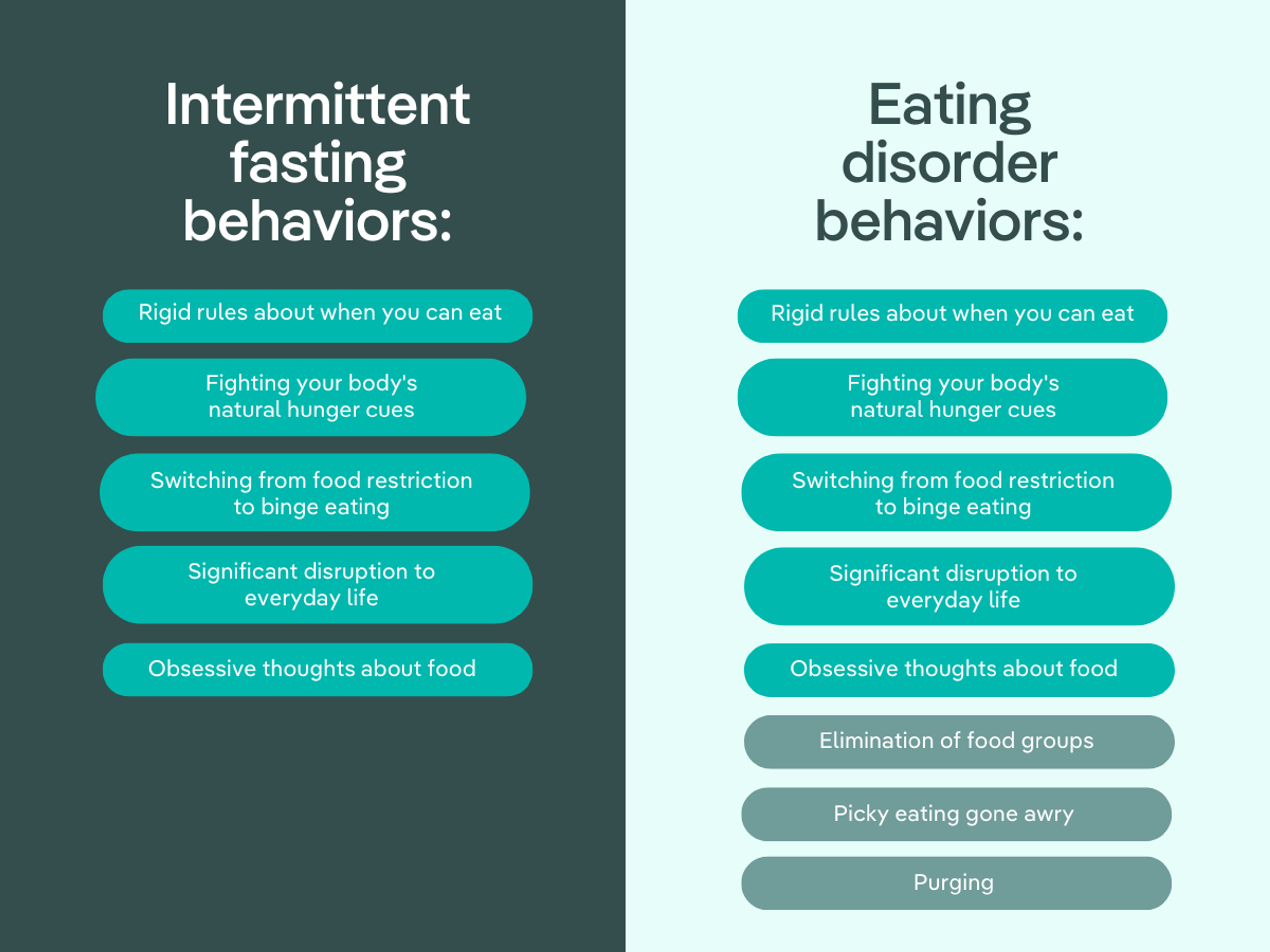


Diet culture is omnipresent in our lives, but it’s always shape-shifting (for instance, people talking about “wellness” rather than weight loss). One of the more recent ways that diet culture has shown up is in the trend of intermittent fasting, or not eating for certain hours of the day. Over the past few years, countless people have jumped on the intermittent fasting bandwagon, usually out of a genuine desire to improve their health. But the reality is, intermittent fasting itself can be a disordered eating behavior, and can lead to other problematic and unhealthy habits. Read on to learn more about the risks and benefits of this practice, the relationship between intermittent fasting and eating disorders, whether it’s safe for those in recovery, and more.
What is intermittent fasting?
Intermittent fasting is an eating approach that now surpasses the ketogenic (keto) diet in popularity among Americans. Instead of setting rules about what types of foods you can and can’t consume (like forbidding carbs with keto), intermittent fasting involves rigid rules about when—rather than what—you eat.
“There’s a length of time in the day when a person chooses to eat, and a length of time they choose to fast,” explains dietitian Lauren Chaffin, RD. “There are several methods with varying time ranges, such as a 16-hour fast with eight hours of eating, or fasting days, in which a person may cut way back on their caloric intake for five days, and then eat in a surplus for the remaining two days of the week.” According to Equip dietitian Rui Tanimura, RD, other intermittent fasters may have one large meal per day and avoid all meals and snacks otherwise. Exactly how it looks will vary from person to person, but the basic principle is the same: limiting food intake during set periods of time, and allowing unrestricted access to food during other periods of time.
The supposed benefits of intermittent fasting
Proponents claim that intermittent fasting has several significant health benefits, such as increasing lifespan, improving conditions associated with inflammation (like Alzheimer’s), preventing cancer, and improving heart health. Weight loss, it should probably go without saying, is also high on the list of touted benefits. “Supporters claim that it’s an effective approach to control or change weight, improve metabolism, and to prevent overeating,” says Tanimura.
While there are some studies supporting the benefits of intermittent fasting, it’s not the type of research that shows direct causation—in other words, the studies might show that intermittent fasting is associated with lower blood pressure, but don’t prove or claim that intermittent fasting itself caused this change. The existing research also lacks data from which we can make any evidence-based recommendations about intermittent fasting.
“Intermittent fasting, just like any other fad diet, has far-reaching claims attached to it,” says Chaffin. “The problem is, the research on intermittent fasting has been done almost exclusively in a lab on animals.” For example, one study showing a link between intermittent fasting and longevity was conducted with fruit flies, and another on mice. Research that associated intermittent fasting with improving inflammation-linked diseases like Alzheimer’s and that suggested it could help prevent cancer also used animals.

“Intermittent fasting, just like any other fad diet, has far-reaching claims attached to it,” says Chaffin. “The problem is, the research on intermittent fasting has been done almost exclusively in a lab on animals.” For example, one study showing a link between intermittent fasting and longevity was conducted with fruit flies and another on mice. Research that associated intermittent fasting with improving inflammation-linked diseases like Alzheimer’s and that suggested it could help prevent cancer also used animals.
Chaffin says the reason for the limited number of human trials is because of the restrictive nature of intermittent fasting. “ It’s not sustainable, so many people drop out or are unable to complete the trial,” she explains.
There are some human studies showing positive associations between intermittent fasting and cardiovascular risk factors like diabetes and hypertension, yet they are too small and too short in duration to draw conclusive recommendations. “There’s just simply no way to know the benefits versus risk factors without looking at a large population of people over a long period of time,” Chaffin says. “The studies that do show ‘improvements’ only last somewhere between one to 12 weeks total. Compared to a lifetime, it’s a tiny blip of time.”
When it comes to what the research says about weight loss, it’s more of the same story, with studies being too small and too short to prove the diet “works” in the long run. “Most intermittent fasting research continues to need more longer-term outcomes,” says Tanimura. Moreover, a recent randomized clinical trial examining the effects of intermittent fasting on weight loss for 12 weeks showed no differences in weight loss between intermittent fasters and consistent eaters.
Like all other restrictive diets, intermittent fasting comes with several potential side effects, like extreme hunger, fatigue, insomnia, nausea, and headaches. Plus, research shows that dieting can lead to eating disorders.
Potential risks of intermittent fasting
Like all other restrictive diets, intermittent fasting comes with several potential side effects. Intermittent fasting risks include:
- Extreme hunger, which can lead to uncontrolled or binge eating
- Fatigue
- Insomnia
- Nausea
- Headaches
- Low or unstable blood sugar
Additionally, intermittent fasting can have negative psychological impacts, including irritability, anxiety, and poor concentration. Research also shows that dieting is one of the biggest risk factors for developing an eating disorder.

Is intermittent fasting an eating disorder?
In short, no, intermittent fasting is not an eating disorder. However, all restrictive diets—including intermittent fasting—can be considered a form of disordered eating, a term used to describe a vast range of unhealthy eating behaviors that don’t necessarily constitute a full-blown eating disorder. That’s because any sort of rigid food rules, like the ones necessary to maintain intermittent fasting, foster unhealthy behaviors around food and a hyperfixation on food and body size, and sever the natural connection between our minds and bodies. “When we use external factors like the time to tell us when we can and can’t eat, we’re telling our bodies that they are not to be trusted, and that the cues and signals they give us can be ignored,” Chaffin explains.
And while intermittent fasting itself is not an eating disorder, it does encourage several behaviors associated with eating disorders. One year-long study of young adults and teens of all genders showed a significant link between intermittent fasting and eating disorder behaviors like compulsive exercise, vomiting, and severe food restriction. Gretchen Wallace, RD, points out that the very structure of intermittent fasting lends itself to another eating disorder behavior: binge eating. “Intermittent fasting involves restriction for a large part of the day followed by a food free-for-all, which could look or feel like a binge,” she explains.
While rigid rules and the behaviors described above are often symptoms of eating disorders, not all intermittent fasters will experience disordered eating behaviors or thoughts. However, “that can change if the diet is followed for a long period of time,” Wallace says. “You won't find intermittent fasting listed as a diagnostic criteria in the DSM, but it can quickly shift from being an experiment for your health to a disordered relationship with food, or a full-blown eating disorder.”
How intermittent fasting can lead to an eating disorder
As Wallace explained, intermittent fasting has the potential to lead to an eating disorder over time. What may start out as a genuine attempt to experience health benefits can become a slippery slope that descends into disordered eating patterns, which often build off of one another and become more extreme. Remember, any restrictive eating pattern carries psychological and physical health risks.
“Your body doesn't understand that this ‘famine’ is self-inflicted, so it's going to be on high alert to increase its ability to survive and find food,” explains Equip Nutrition Director Erin Reeves, RD. “You might be thinking about food more or feel more out of control when you do eat because your body can't trust there won't be a famine again.” That's why it's often hard to tell the difference between a diet and an eating disorder.
Tanimura tried intermittent fasting herself, and says it was one of the behaviors that ultimately led to her eating disorder diagnosis. “It is an extreme behavior that can likely trigger other eating disorder behaviors or attitudes, such as body dissatisfaction, a desire to adopt severe restriction methods, binge eating, low self-esteem, food rules, and attempting to ignore and suppress hunger cues,” she says. Learning about the Minnesota Starvation Experiment can help illuminate why fasting can have this effect.
Intermittent fasting and eating disorder recovery
Attempting intermittent fasting while in eating disorder recovery would be similar to trying to drink one glass of wine a day when you’re in recovery from alcohol use disorder: it would likely be a fast track to relapse. As an eating disorder dietitian, this analogy is how I help my clients in recovery understand that going on the next diet du jour may set them up for a relapse.
Plus, the principles of intermittent fasting and eating disorder recovery are in direct conflict with each other. “The components of intermittent fasting do not align with the pillars of eating disorder recovery, such as creating consistent meal and snack times every two to four hours, feeling and honoring our hunger and fullness cues, and removing debilitating food rules,” Tanimura explains.
What’s more, intermittent fasting and other diets are externally driven, taking us further away from our bodies, ourselves, and our values—just like eating disorders do.
“I would never recommend dieting to a person in recovery, and intermittent fasting is going to be particularly triggering due to its similarity to disorders like anorexia, binge eating disorder, bulimia, and OSFED,” Wallace says. “If you’re in recovery from an eating disorder and are interested in the alleged health benefits of intermittent fasting, I suggest talking to an eating disorder clinician about how to incorporate health-promoting behaviors into your recovery rather than pursuing a diet such as intermittent fasting.”
Healthy alternatives to intermittent fasting
Whether you have an eating disorder or not, the healthiest way of eating is one that supports your mental, emotional, and physical well-being, and helps you live in alignment with your core values. One specific eating framework, called intuitive eating, fosters healthy food and body relationships, and includes principles like honoring hunger and fullness cues and getting satisfied at all meals and snacks. Intuitive eating encourages internal guidance (rather than relying on the clock or rules) from your own body and mind and helps you reconnect to your innate ability to nourish yourself.
However, if you are struggling with an eating disorder and early in the recovery process, it’s important to work with your treatment team to find the best eating pattern for you right now. That may be using a specific meal plan, the plate-by-plate-approach, or a different structure. Eating intuitively in recovery usually takes time and intentional steps with professional guidance and support, and it usually happens later in recovery.
Here are a few general tips for finding balance in eating and building a positive relationship to food, which will support your overall mental and physical well-being:
- Eat every few hours during the day, including meals and snacks.
- Ensure you eat from all the food groups on a regular basis (carbs, fats, proteins, dairy or dairy alternatives, fruits, and veggies).
- Include sources of the three macronutrients (carbs, fats, and proteins) at each meal.
- Leave room for “fun foods,” or less nutritious foods that you enjoy (think French fries and cake).
- Remember your needs can change from day to day, and that’s okay.
Keep in mind that if you’re in early recovery, or have specific nutrition needs or concerns, it’s best to work with a dietitian, at least at first.
The Equip takeaway on intermittent fasting
Intermittent fasting may be trendy and flashy, but its alleged benefits are not based on solid evidence, and it carries several risks that can seriously harm your physical and mental health. Additionally, it can lead to disordered eating behaviors or even an eating disorder. While it can be tempting to join the latest diet trend and all it appears to offer, the healthiest choice is to prioritize your holistic well-being, which can’t be found in any restrictive diet or eating pattern.
If you or someone you love is struggling with disordered eating or rigid food rules that are interfering with your health and ability to live a full life, it’s important to get help. Speak to your medical provider or schedule a consultation with an Equip team member.

FAQ
What is intermittent fasting and how does it work?
Intermittent fasting is a restrictive diet that focuses on meal timing instead of meal composition. It requires you to fast for a certain period and eat during a specific timeframe, and there are several methods to choose from. For example, one method includes fasting for 16 hours and eating in an 8-hour window, while another requires you to alternate fasting days.
Are there proven benefits to intermittent fasting?
There is some research that suggests intermittent fasting has certain benefits, such as increasing lifespan, improving conditions associated with inflammation (like Alzheimer’s), preventing cancer, and improving heart health. Weight loss is also a “benefit” from a weight-centric perspective. However, the studies backing such claims are weak, because they only show association—not causation—and mostly use animals like mice and fruit flies. Although some human studies exist, they’re too small and short to be conclusive or used as the basis for nutrition recommendations.
Can intermittent fasting lead to an eating disorder?
Yes, any restrictive diet—including intermittent fasting—can lead to an eating disorder. Disordered eating and intermittent fasting go together, since behaviors like restriction, ignoring the body’s cues, and adhering to rigid food rules are both inherent to intermittent fasting and eating disorder symptoms. Plus, research shows a link between intermittent fasting and other disordered behaviors, like compulsive exercise, vomiting, and severe food restriction.
How can intermittent fasting impact mental health?
Aside from potentially leading to an eating disorder or relapse, intermittent fasting can cause irritability, mood and personality changes, and anxiety.
Is it safe to try intermittent fasting if I’m in recovery from an eating disorder?
No. Like it’s unsafe for a person recovering from alcoholism to spend lots of time in a bar or attempt drinking just one glass of wine with dinner, it’s also unsafe for someone in eating disorder recovery to go on any restrictive diet—including intermittent fasting—because it’s often a slippery slope back into the depths of the eating disorder.
What are healthier alternatives to intermittent fasting?
The healthiest way of eating is one that supports your overall wellness and helps you live in alignment with your core values. Intuitive eating is an eating framework that fosters healthy food and body relationships, and includes principles like honoring hunger and fullness cues and getting satisfied at all meals and snacks. It helps you reconnect to your innate ability to nourish yourself.
- Patterson, Ruth E et al. “Intermittent Fasting and Human Metabolic Health.” Journal of the Academy of Nutrition and Dietetics vol. 115,8 (2015): 1203-12. doi:10.1016/j.jand.2015.02.018
- Catterson, James H et al. “Short-Term, Intermittent Fasting Induces Long-Lasting Gut Health and TOR-Independent Lifespan Extension.” Current biology : CB vol. 28,11 (2018): 1714-1724.e4. doi:10.1016/j.cub.2018.04.015
- Mitchell, Sarah J et al. “Daily Fasting Improves Health and Survival in Male Mice Independent of Diet Composition and Calories.” Cell metabolism vol. 29,1 (2019): 221-228.e3. doi:10.1016/j.cmet.2018.08.011
- Shin, Bae Kun et al. “Intermittent fasting protects against the deterioration of cognitive function, energy metabolism and dyslipidemia in Alzheimer's disease-induced estrogen deficient rats.” Experimental biology and medicine (Maywood, N.J.) vol. 243,4 (2018): 334-343. doi:10.1177/1535370217751610
- Welton, Stephanie et al. “Intermittent fasting and weight loss: Systematic review.” Canadian family physician Medecin de famille canadien vol. 66,2 (2020): 117-125.
- Varady, Krista A et al. “Clinical application of intermittent fasting for weight loss: progress and future directions.” Nature reviews. Endocrinology vol. 18,5 (2022): 309-321. doi:10.1038/s41574-022-00638-x
- Ganson, Kyle T et al. “Intermittent fasting: Describing engagement and associations with eating disorder behaviors and psychopathology among Canadian adolescents and young adults.” Eating behaviors vol. 47 (2022): 101681. doi:10.1016/j.eatbeh.2022.101681
- Ganson, Kyle T et al. “Intermittent fasting: Describing engagement and associations with eating disorder behaviors and psychopathology among Canadian adolescents and young adults.” Eating behaviors vol. 47 (2022): 101681. doi:10.1016/j.eatbeh.2022.101681







